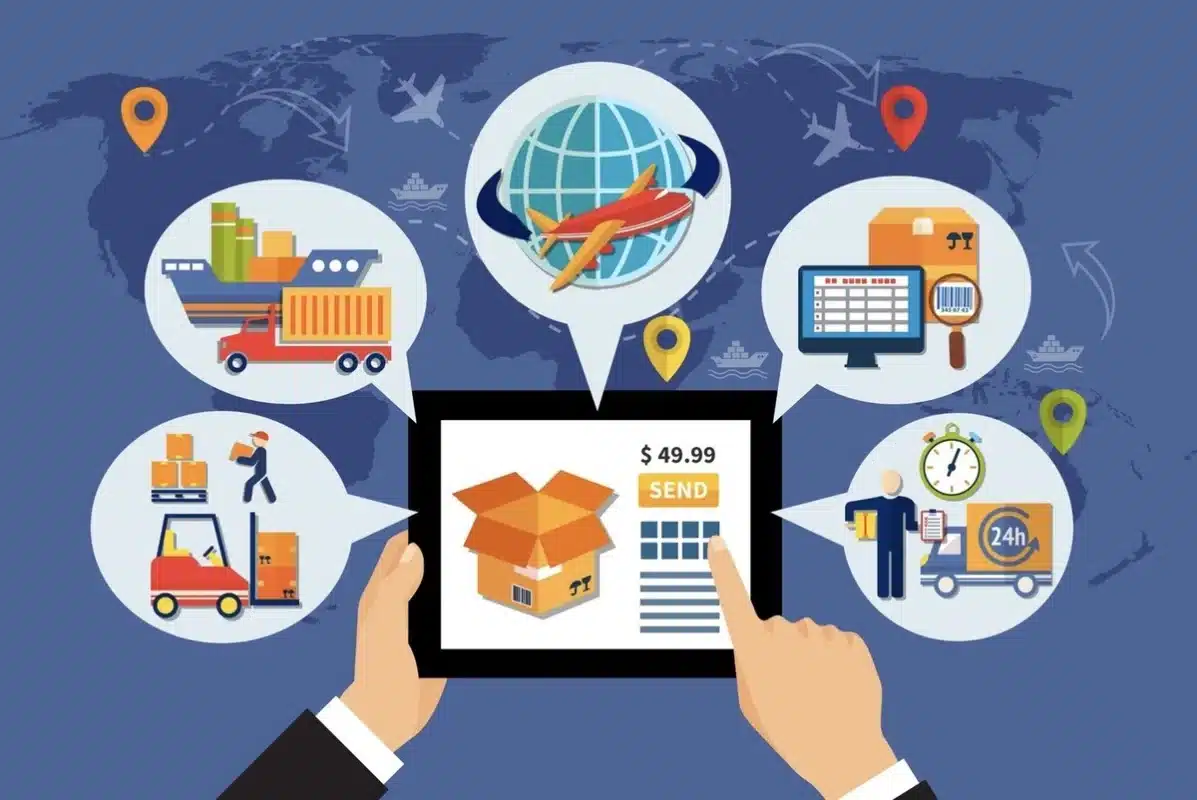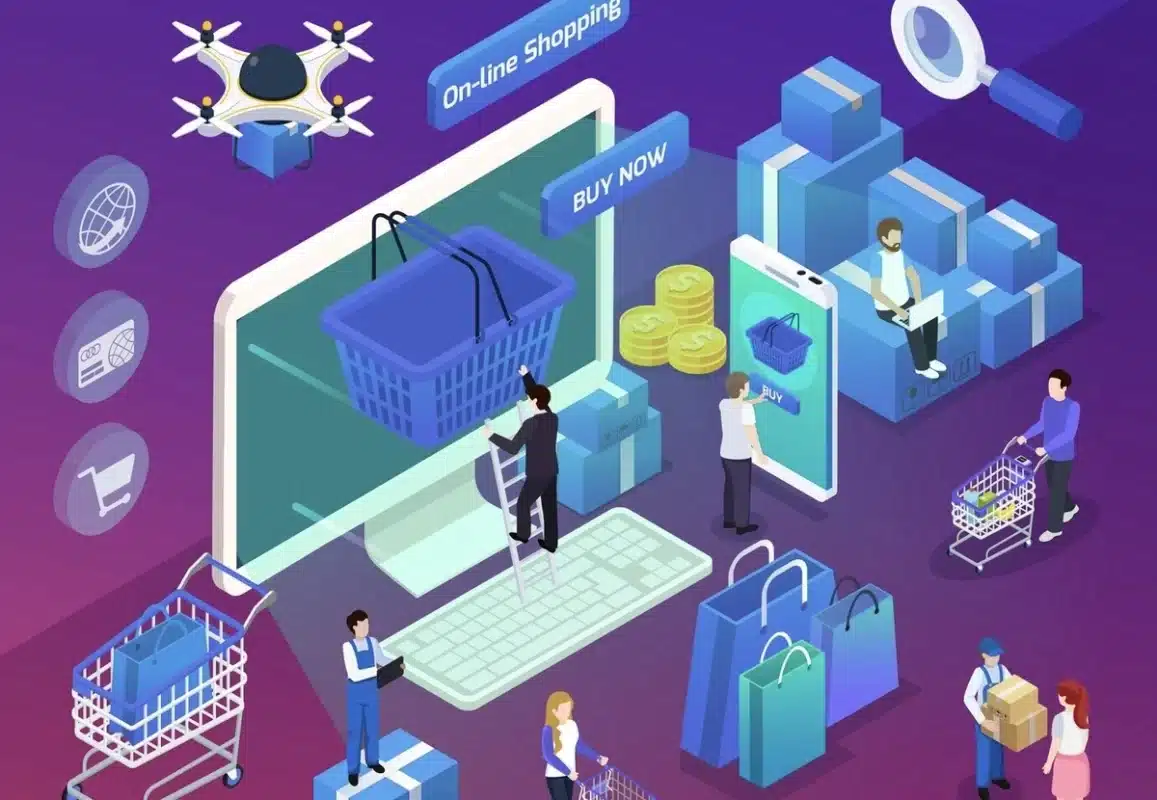- What is Ecommerce?
- Is Ecommerce Worth it in 2025?
- Future Trends of Ecommerce
- How to Build an Ecommerce Business
- Ecommerce Marketing Strategies
- Conclusion
- FAQs
- Q1. What are the benefits of investing in eCommerce in 2025?
- Q2. How can I guarantee a profit in eCommerce in 2025?
- Q3. Should I prioritize cybersecurity for my eCommerce firm in 2025?
- Q4. How can I stay current on eCommerce trends and best practices in 2025?
- Q5. What challenges should I know while starting an eCommerce business in 2025?
Is Ecommerce Worth it in 2025?

- What is Ecommerce?
- Is Ecommerce Worth it in 2025?
- Future Trends of Ecommerce
- How to Build an Ecommerce Business
- Ecommerce Marketing Strategies
- Conclusion
- FAQs
- Q1. What are the benefits of investing in eCommerce in 2025?
- Q2. How can I guarantee a profit in eCommerce in 2025?
- Q3. Should I prioritize cybersecurity for my eCommerce firm in 2025?
- Q4. How can I stay current on eCommerce trends and best practices in 2025?
- Q5. What challenges should I know while starting an eCommerce business in 2025?
As we venture into 2025, the big question on many minds is, “Is eCommerce worth it in 2025?” With technology advancing rapidly and consumer habits evolving, businesses are evaluating the value of selling online.
There’s much to weigh up, from the latest trends to changing customer preferences.
Join us as we explore the potential of eCommerce in 2025, considering its benefits, challenges, and strategies for success in the digital marketplace.
What is Ecommerce?
Ecommerce, known as electronic commerce, buys and sells goods or services online.
In 2025, many are asking: is eCommerce worth it in 2025?
This commerce method spans a wide array of online transactions, from retail purchases on websites to business-to-business transactions.
Ecommerce offers convenience, accessibility, and global reach, allowing businesses and consumers to transact without physical interaction.
It involves online shopping, electronic payments, digital marketing, and supply chain management, all facilitated through internet-enabled devices like computers, smartphones, and tablets.
Additionally, connective eCommerce focuses on the interconnected nature of online commerce, where businesses, consumers, and even communities are linked through digital channels, creating a seamless and dynamic marketplace experience.
Is Ecommerce Worth it in 2025?
In 2025, the eCommerce landscape continues to thrive, presenting abundant business opportunities.
The fast rise of online buying, pushed by the global pandemic, has remained well beyond the initial crisis, indicating eCommerce’s long-term significance.
Several reasons contribute to its ongoing functionality, which makes it still worth it in 2025:
1. Convenience

When asking, “Is eCommerce worth it in 2025?” convenience is critical.
Online shopping is super easy. With just a few clicks, you can browse and buy whatever you want, anytime, anywhere.
Mobile shopping makes it even simpler. Ecommerce websites are user-friendly, and paying is a breeze.
Plus, quick delivery options mean you get your stuff fast. Ecommerce in 2025 is about making shopping easy and fast for everyone.
2. Market Reach

In 2025, eCommerce helps businesses reach more people around the world.
With the internet and smartphones so common, online stores let companies sell to customers everywhere.
Big or small businesses can use the internet to connect with different kinds of people worldwide.
By using innovative marketing and making their products fit local tastes, they can attract customers from all over.
Plus, with international online shopping becoming more accessible, even small businesses can sell to customers in other countries.
Better shipping and simpler customs make it all smoother.
Ecommerce lets businesses break through old limits and find new customers at home and abroad, which is essential for today’s economy.
3. Personalization

Are you curious about whether eCommerce is worth it in 2025?
Let’s take a closer look. In today’s digital era, online shopping offers unparalleled convenience.
Whether lounging on the sofa, tucked into bed, or out and about with your smartphone, browsing and buying from virtually anywhere is undeniably convenient.
Moreover, online retailers have mastered the art of personalization.
Using sophisticated algorithms, they make product recommendations based on past purchases, making your shopping experience uniquely catered to your tastes.
So, when thinking about the value of eCommerce in 2025, the answer is an obvious yes!
4. Technological Innovations

In 2025, online shopping will get even more fabulous with the new tech stuff.
Imagine trying on clothes using your phone or seeing how furniture looks in your room before buying it. That’s what Augmented reality (AR) and Virtual reality (VR) do.
They make online shopping more fun and help you pick the right stuff. Plus, intelligent computers learn what you like and suggest things you might want to buy.
If you have questions while shopping online, virtual helpers are there to chat with you and give you answers right away.
Also, a unique blockchain technology helps ensure everything is safe and trustworthy.
With all these cool tech gadgets, online shopping keeps getting better, making it an excellent way for businesses to sell things and for us to find what we need.
5. Sustainability

“Is eCommerce worth it in 2025?” That’s the big question, and here’s one of the reasons why it is Sustainability.
More and more people care about the environment, and eCommerce is stepping up to meet that concern.
Online shops use eco-friendly packaging and find greener ways to deliver stuff to your doorstep.
They’re also being transparent about where their products come from, so you can make eco-friendly choices.
So, in 2025, eCommerce is worth considering if you’re into helping the planet because it’s trying to be more environmentally friendly.
6. Omnichannel Integration

In 2025, merging online and offline shopping experiences is critical to thriving in eCommerce.
This means ensuring everything feels interconnected and smooth whether customers shop on websites, apps, social media, or physical stores.
This approach helps businesses grasp customers’ desires and deliver more personalized experiences, offering click-and-collect options, same-day delivery, and in-store pickup to provide a unified shopping experience.
For instance, someone might spot an item online and later decide to buy it in-store, or they might browse in a physical store and then purchase it online.
Businesses can use data from these interactions to enhance their marketing strategies and refine their shopping journey.
By integrating these diverse shopping avenues, eCommerce companies may boost deeper customer connections and stay competitive, which is essential when considering the query, “Is eCommerce worth it in 2025?”
Future Trends of Ecommerce
Is eCommerce worth it in 2025? This can be solved by especially considering these future trends:
- Augmented Reality (AR) and Virtual Reality (VR) Shopping Experiences: AR and VR technologies are set to transform online shopping, allowing customers to virtually try products before purchasing, enhancing the overall shopping experience.
- Voice Commerce: Voice assistants are becoming more advanced, leading to the rise of voice commerce. Customers can conveniently place orders and receive personalized recommendations using voice commands.
- Artificial Intelligence (AI) and Machine Learning: AI and machine learning will continue to improve eCommerce platforms, providing personalized recommendations, optimizing pricing, and enhancing customer service through chatbots.
- Mobile Commerce (mCommerce): With the increasing use of smartphones, mCommerce is rising. Businesses will focus on optimizing their mobile platforms for seamless and intuitive shopping experiences.
- Social Commerce: Social media platforms will play a significant role in eCommerce, offering shoppable posts, live shopping events, and in-app checkout options to reach customers and drive sales directly.
- Subscription Services and Membership Programs: Subscription-based models will become more prevalent, offering customers convenience and savings while providing businesses recurring revenue streams and increased loyalty.
- Personalized Packaging and Customer Experience: Customized packaging and personalized experiences will differentiate brands and create memorable customer interactions, fostering loyalty and satisfaction.
- Cryptocurrency and Blockchain Technology: Cryptocurrency payments and blockchain technology will offer secure and decentralized payment options, reducing transaction fees and enhancing security for eCommerce transactions.
These emerging trends highlight the potential for eCommerce to continue thriving in 2025 and beyond, offering businesses opportunities for growth and innovation in the digital marketplace.
How to Build an Ecommerce Business
Once you have concluded whether eCommerce is worth it in 2025? It is essential to start building your eCommerce platform for business.
- Market Research: Determine your target market and specialization. Conduct extensive research to better understand customers’ requirements, tastes, and purchasing habits. Analyze competitors to find divisions in the market and points of difference.
- Choose your products: Determine which items or services to sell depending on your market study. Consider demand, competition, profit margins, and your skills or hobbies.
- Create a Business Plan: A thorough business plan should include your company’s goals, target audience, marketing tactics, financial predictions, and operational strategy. This will serve as a road map for your online business.
- Choose an Ecommerce Platform: Choose an appropriate eCommerce platform for your online store. Popular choices include Shopify, WooCommerce, Magento, and BigCommerce. Consider considerations such as usability, customization, scalability, and price.
- Designing Your Online Store: Customize your eCommerce website to represent your brand’s identity and appeal to your intended audience. Develop an appealing PDP, Prioritize user-friendly navigation, informative product descriptions, high-quality photos, and a smooth checkout experience.
- Set Up Payment Gateways: Select safe and dependable payment gateways to take online payments from clients. Consider incorporating several payment methods to meet varied preferences and decrease cart abandonment.
- Handle Inventory: Use inventory management systems to monitor stock levels, handle orders, and automate reordering operations. Ensure adequate inventory management to avoid stockouts and reduce surplus inventory.
- Optimize for SEO: To boost visibility and increase genuine visitors, optimize your eCommerce website’s search engine. Use relevant keywords, improve your search engine ranking, improve your product descriptions and meta tags, and develop high-quality content.
- Develop Marketing Strategies: Create a marketing strategy to help your eCommerce business gain clients. Use various digital marketing methods, including SEO and Compound SEO, social media marketing, email marketing, content marketing, and paid advertising.
- Provide excellent customer service: To win trust and loyalty, focus on providing excellent customer service. Provide different forms of customer support, respond quickly to questions and difficulties, and seek to fulfill customer expectations at all interactions.
- Track Performance: Monitor important performance information like revenue, website traffic, conversion rates, customer costs, and lifetime value. Use analytics tools to learn about consumer behavior and make data-driven decisions to improve your eCommerce business.
- Continuous Improvement: Monitor market trends, consumer input, and competition to identify weak areas for improvement and innovation. Adapt your strategies accordingly to stay competitive and drive growth in your eCommerce business.
Ecommerce Marketing Strategies
- Google Visibility: Ensure that your website ranks well on Google by targeting keywords and phrases related to your offerings.
- Informative Content: Create blogs or videos that instruct people about topics connected to your products to ignite their interest and increase sales.
- Social Media Presence: Use sites like Facebook, Instagram, Twitter, and Pinterest to promote your items and interact with potential buyers. Advertising can help you reach a larger audience.
- Email Advertising: Create an email account and update customers on new items or special offers to increase return visits and sales.
- Paid Advertising: Invest in customized advertisements on sites like Google, Facebook, or Instagram to attract new customers and increase sales
- Retargeting: Use retargeting steps to bring back visitors who have previously visited your website or left their shopping carts, reminding them of the products they were interested in and urging them to finish their purchase.
- Affiliate Marketing: Collaborate with affiliate marketers or influencers to promote your items in exchange for a commission on purchases made via their referral links, utilizing their audience and experience to increase sales.
- Loyalty Programs: Provide discounts, award points, and special offers to stimulate repeat purchases, enhance customer retention, and create brand loyalty within your existing consumer base.
- User-Generated Content (UGC): Encourage consumers to develop and share user-generated material, like reviews, images, and videos highlighting their experiences with your products, to establish social proof and trust for your brand.
Conclusion
In conclusion, the answer to “Is eCommerce Worth It in 2025?” is undoubtedly yes.
As technology evolves and customer preferences change, eCommerce remains legitimate and an essential medium for business success.
Its advantages, ranging from global reach to improved consumer experiences, make it a crucial strategy for success in the digital era.
Implementing eCommerce is not just an option but a need for success in today’s competitive world.
FAQs
Q1. What are the benefits of investing in eCommerce in 2025?
Investing in eCommerce in 2025 offers several benefits. It enables firms to enter a global market, operate with fewer overhead costs, get significant data insights, and provide seamless shopping experiences to customers globally.
Q2. How can I guarantee a profit in eCommerce in 2025?
Ensuring profitability with eCommerce in 2025 will need a planned strategy. Focus on providing in-demand items, structuring your online store for optimum conversions, executing successful marketing techniques, and constantly reacting to market changes.
Q3. Should I prioritize cybersecurity for my eCommerce firm in 2025?
Absolutely. With the growing frequency of cyber attacks, addressing cybersecurity is critical for protecting sensitive consumer data, securing transactions, and preserving confidence. Invest in solid security measures and be informed about the current dangers.
Q4. How can I stay current on eCommerce trends and best practices in 2025?
In 2025, stay current on eCommerce trends and best practices by reading industry magazines, attending conferences, participating in online groups, and networking with other eCommerce experts. It would be best to constantly alter your strategy to be competitive in an ever-changing sector.
Q5. What challenges should I know while starting an eCommerce business in 2025?
While eCommerce provides numerous potentials, it also raises challenges such as tough competition, cybersecurity dangers, logistics complexities, and meeting customer expectations. However, with appropriate preparation and execution, these challenges can be overcome.

Kartika Musle
A Tech enthusiast and skilled wordsmith. Explore the digital world with insightful content and unlock the latest in tech through my vision.

Leave a Reply